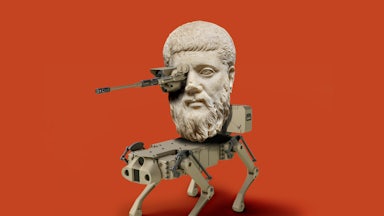Other than the joys and sorrows of leaving New York City (or staying there), no recent topic has launched more exasperating essays than “cancel culture.” When Glenn Greenwald departed The Intercept late last year, he wrote an extraordinary missive of more than 3,000 words, accusing the editors of attempting to censor him. Bari Weiss and Andrew Sullivan resigned from The New York Times and New York magazine, respectively, both citing an intolerably illiberal culture of woke conformism. These are just a few examples.
Today’s diverse cast of anti-woke, anti–cancel culture agitators run the gamut, from civil libertarian critics of empire to self-styled neoliberals, middlebrow intellectuals to GOP opportunists. For all their wildly varying political views and commitments, they have broadly coalesced around a single set of rhetorical points. Moderation, whether by governments or private entities, is censorship; social approbation is inherently totalitarian; and any attempt to link speech and expression to other rights, to hierarchies of power, to access to prominent gigs in paid media or the college-campus lecture circuit constitutes a strong push down an icy slope to the gallows.
This perplexingly apocalyptic mindset seems to conflate getting nitpicked by an editor, yelled at on social media, or losing an occasional opportunity to rile up an auditorium of snowflake undergraduates with the purges and disappearances of a totalitarian state. But it also has clear roots in a pair of rhetorical and technological developments in the 1990s. Many of these figures, who are largely members of Gen X or older millennials, came up in the 1990s culture wars, and then found professional prominence in a media landscape dominated by online platforms and publishing. Their incredulous attitude toward any suggestion that there should be limits on what one ought to say, or even a debate about those limits, is the dual legacy of the internet’s own peculiar rhetorical ideology and America’s cyclical, never-ending culture wars.
In 1993, John Gilmore, an early internet pioneer, told Time magazine, “The Net interprets censorship as damage and routes around it.” Gilmore was already an éminence grise of the computing world and the fifth employee of Sun Microsystems, the company that created Java and helped develop many other crucial technologies. He and several other early internet figures had emerged from the libertarian strain of the counterculture of the 1960s and 1970s, and their anti-establishment spirit infused early online communities with a palpable sense of transgression. The public internet was still in its infancy, but a geometrically expanding user base was about to leave the walled gardens of early commercial networks like America Online to enter a more anarchic, smutty, and rambunctious online world—where anyone could say anything, and where someone surely would.
Freed from the fetters of gatekeeping publications and loosed upon freewheeling forums and chat rooms, which would soon become blogs and newspaper comments sections, an army of Herzogs (including professionals such as Slate columnist and early blog adopter Mickey Kaus and an ever-expanding cast of pseudonymous amateurs—often cranky and brilliant, but also prolix and picayune) suddenly found themselves with outlets and audiences for their theories, gripes, and polemics.
At the time, the idea that a censorious, even Stalinist, culture of repression, grown in the radical hothouses of elite universities, had been foisted upon schools, workplaces, HR departments, and the country at large was gaining widespread currency. The primary antagonism toward political correctness came from the political right: Everyone from conservative writers like Roger Kimball and Dinesh D’Souza; to Rush Limbaugh, who arguably achieved the squalid, bullying, vulgar height of his fame and power in the ’90s; to George H.W. Bush, who, in 1991, asserted that political correctness “replaces old prejudice with new ones” and “declares certain topics off-limits, certain expression off-limits, even certain gestures off-limits.” But this kind of thinking also found plenty of willing allies among the more libertarian, libertine, and individualistic figures on the left. In 1993, Bill Maher, a left-leaning, weed-smoking comedian, premiered Politically Incorrect. The following year, 20th Century Fox released PCU, an initial box-office flop that went on to become a great frat-house VHS cult classic for its broad, gross satire of politically correct college life. These debates about political correctness were never really resolved, although they went into abeyance during the patriotic hysteria after September 11.
Contemporary crusaders against cancel culture take an ostensibly maximalist view of free speech: If it can be said, it must be said. They tend to conflate criticism with censorship, the right to speak with the right to have an audience. They view with contempt the idea that certain utterances may be beyond the pale, and reject the idea that they should ever be bystanders or students rather than interlocutors in a conversation.
Having come up in the ’90s, and very online, myself, I feel the pull of this argument. Online discourse, unconstrained by politesse, by editorial standards, by antiquated mores, and by boring restraint, is thrilling and heady. It can even feel daring and heroic, all wild abandon and the toppling of sacred cows. On the internet, expertise is instantaneous; we all perform in exaggerated avatars of ourselves, which only reinforces the cultural message that more speech (never mind what speech) is always better, and that the individual—not editors, publications, collectives, contemporary mores, or social solidarity—is the final arbiter of value, accuracy, and decency.
There is also something regressive and a bit adolescent about this sort of thinking, as though all the cancel culture complainers long for are evenings at the debate club and late-night rap sessions full of grand philosophical gestures and free from the grotty pressures of real life. It may be why so many cancel culture critics are fixated on the college campuses they themselves have long since left. The concession and compromises of adulthood are rarely as fun or as heroic as the caffeinated debates of their youth, when they could say and do almost anything, parked in a beanbag chair in a red-brick dorm.
These thinkers are unwilling or unable to grasp that debate alone cannot resolve many of the problems we face—climate, inequality, poverty, disease. They are not mere exercises. They are material and real, and they are immune to cleverness and outrageousness. They require solidarity and collective action as much as they require argument. Reflecting on the often-failed promises of the countercultural 1960s, the writer Todd Gitlin lamented that “the extravagance of its libertarian strain” had overwhelmed the collective solidarity necessary for real revolutionary change. But here we are, five decades later, fighting the same pointless culture war, while real power has only continued to concentrate in the hands of an extraordinarily wealthy economic and political elite. Are we doomed to repeat the same failures, or can we learn a lesson?








